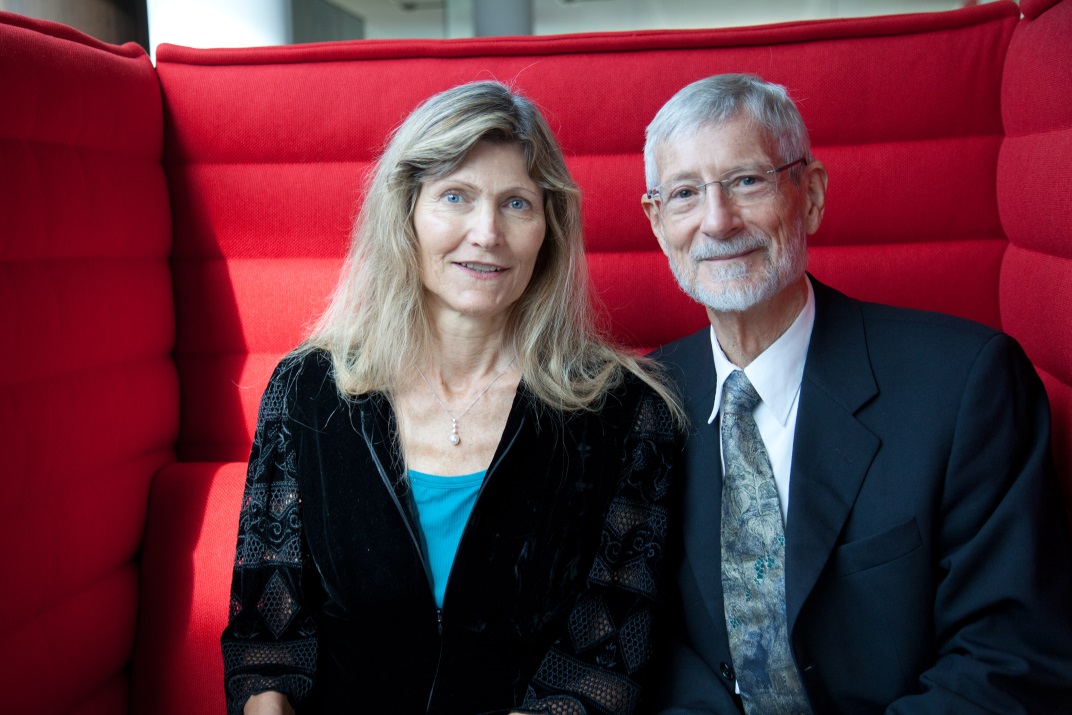 INNSBRUCK, Austria, January 7, 2015. The National Academy of Engineering announced today that bioengineering pioneers and MED-EL Medical Electronics GmbH co-founders Ingeborg Hochmair, PhD, and Professor Erwin Hochmair have been awarded the 2015 Fritz J. and Dolores H. Russ Prize, for engineering cochlear implants that enable the deaf to hear. The prize is shared with Duke University Professor Blake Wilson, MED-EL advisor and Director of MED-EL's first US-based, onsite basic research laboratory in Durham, NC; Professor Graeme Clark, University of Melbourne; and Professor Emeritus Michael Merzenich, University of California, San Francisco.
INNSBRUCK, Austria, January 7, 2015. The National Academy of Engineering announced today that bioengineering pioneers and MED-EL Medical Electronics GmbH co-founders Ingeborg Hochmair, PhD, and Professor Erwin Hochmair have been awarded the 2015 Fritz J. and Dolores H. Russ Prize, for engineering cochlear implants that enable the deaf to hear. The prize is shared with Duke University Professor Blake Wilson, MED-EL advisor and Director of MED-EL's first US-based, onsite basic research laboratory in Durham, NC; Professor Graeme Clark, University of Melbourne; and Professor Emeritus Michael Merzenich, University of California, San Francisco.
The lives of nearly 450,000 people of all ages around the world have been touched, and in many cases, transformed, because of the vision and work of many researchers, engineers and surgeons. The cochlear implant was, and remains, the first replacement of a human sense: the sense of hearing.
The Hochmairs are being recognized for their outstanding bioengineering achievements toward the development of cochlear implants.
"Our corporate mission is now the same as our personal mission from the start: to overcome hearing loss as a barrier to communication and quality of life," said Ingeborg. "While it was possible to develop the very first multichannel cochlear implant system as a very small engineering team, our current development team is comprised of approximately 250 engineers and physicists, all working passionately towards future technological advances for existing and new recipients of hearing implant systems."
"Designing and further developing hearing implants has been so intriguing because it involves many different fields of science and engineering such as circuit design, microelectronics, radio frequency engineering, mechanical engineering, material science, information technology, software development, and acoustics in addition to the physiological complexities associated with working with the human body," said Erwin. "But, it is so much more than an engineering task. Opening the world of sound to people living in silence is an idea that would have once been ridiculous. It's humbling to think of the many infants, children and adults from around the world who have had doors opened because of this technology - an idea whose time had come."
Early Success Makes History
In 1975, cochlear implant development in Vienna was initiated by Ingeborg Hochmair, a PhD in electrical engineering, and Erwin, a Professor at the Technical University in Vienna, at the request of Professor Kurt Burian, head of the ENT-Clinic at the University ofVienna. The implant had eight channels, a stimulation rate of 10,000 pulses per second per channel, eight independent current sources and a flexible electrode for 22-25mm insertion into the cochlea. This led to the world's first multichannel, micro-electronic cochlear implant surgery in Vienna, Austria, on December 16, 1977. Professor Kurt Burian performed the early implant surgeries.
Looking Toward the Future
Today, MED-EL is a worldwide leader in hearing implant technology. Early cochlear implant discoveries have led to the development of new technologies to treat hearing loss, including electric-acoustic stimulation and auditory brain stem implants. While once limited in scope, the adoption of cochlear implants continues to expand around the world. However, there remains a great need for improved access to this technology, which has the potential to improve the lives of many millions of people globally.
Speaking to future bioengineers and researchers, Ingeborg said, "We live during one of the most exciting times in history for biomedical research and development. The outgrowth of technological advances has been exceptional in terms of the possibilities for people with hearing loss and many other medical conditions. What seemed impossible just a generation ago, is now not only possible, but has become widespread practice. There are so many further developments awaiting realization and many discoveries yet to be made."
About MED-EL
MED-EL Medical Electronics is a leading provider of hearing implant systems worldwide. The company was founded by Austrian scientists and industry pioneers Ingeborg and Erwin Hochmair, who together developed the world's first microelectronic, multichannel cochlear implant in 1977. The cochlear implant was and remains the first replacement of a human sense, the sense of hearing. In 1990, the Hochmairs laid the foundation for the successful growth of the company when they hired their first employees. Today, the privately-held company has more than 1,500 employees around the world. Individuals in more than 100 countries enjoy the gift of hearing with a MED-EL Hearing Implant System.
MED-EL's mission is to overcome hearing loss as a barrier to communication and quality of life. The company offers the widest range of implantable solutions worldwide to treat the various degrees of hearing loss, including cochlear, middle ear and bone conduction implant systems as well as a system for combined electric and acoustic stimulation.
The Hochmairs and entire MED-EL family congratulate all of this year's Russ Prize recipients.
For more information, visit https://www.medel.com/us/ or the Med-El Expo Page on AudiologyOnline.

